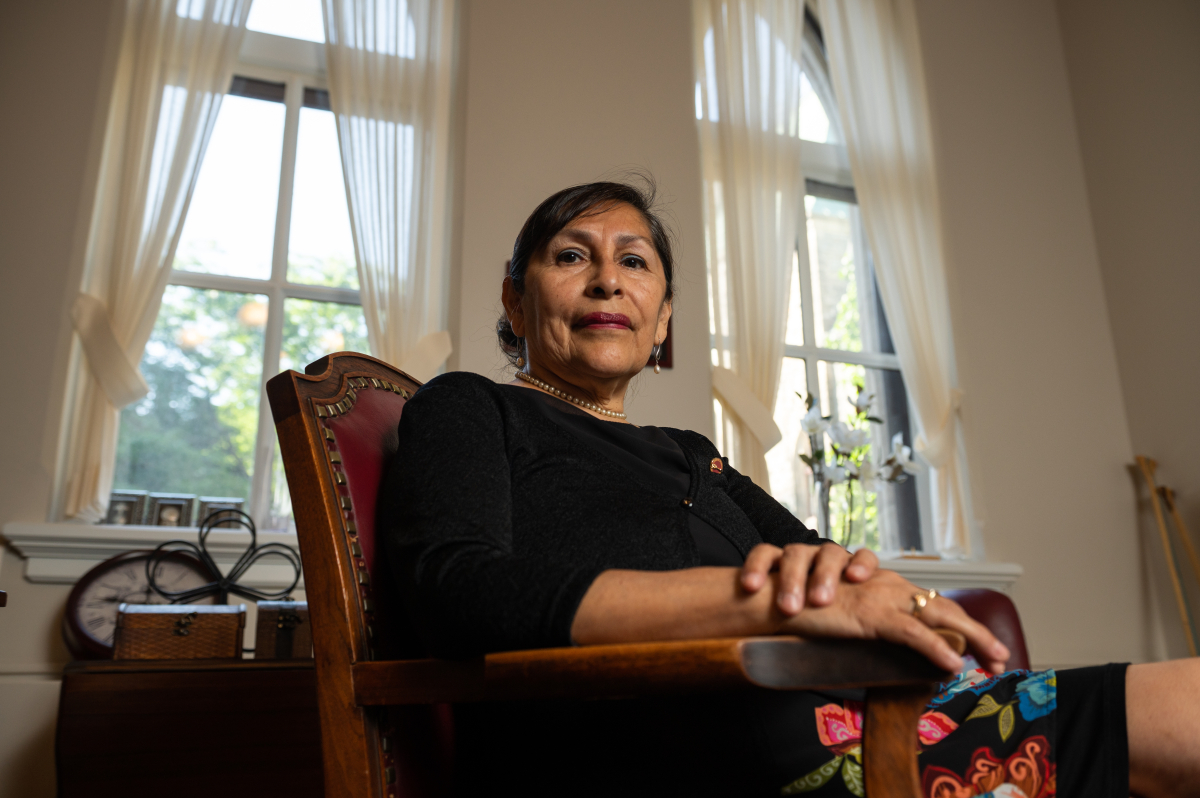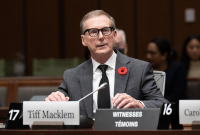Support strong Canadian climate journalism for 2025
It’s estimated that the Canadian economy could take a $5.5-trillion hit by the end of the century due to climate change, according to a white paper from Independent Sen. Rosa Galvez’s office published this week as sustainable finance experts and policymakers descended on Ottawa for a high-level conference Wednesday.
The staggering sum was sourced from Queen’s University’s Institute for Sustainable Finance, which also found in a study last year that trillions of dollars could be saved if global warming is held to the Paris Agreement’s goals. Already climate change is pushing the cost of food up and up to 10 per cent of homes are or will soon be uninsurable due to the growing frequency of catastrophic natural disasters.
At the root of the climate crisis is burning fossil fuels, and beyond the Earth’s temperature being pushed to unsafe levels leading to lethal consequences, it’s also expected to exacerbate economic crises.
Still, as attendees at the sustainable finance conference heard, there are plenty of options at hand to set Canada on a safer path.
UN Special Envoy on Climate Action and Finance and former governor of the Bank of Canada Mark Carney told attendees that we’re in an age of crises. From war and geopolitical instability to energy and financial crises, the stakes are enormous, he said.
The only way the world can meet emission reduction targets is if a majority of existing fossil fuel reserves stay in the ground, he said. Meeting the Paris Agreement goal of holding global warming to 1.5 C necessitates some fossil fuel assets becoming stranded, a financial term for when the profitability of an asset, like an oil rig or an untapped gas deposit, loses significant value. This has major implications for banks that have financed fossil fuel companies with an expectation those fossil fuels will be extracted and sold for profit.
Thankfully, there are answers to these challenging problems, according to Carney. Canada could be a “clean energy superpower,” but it needs a sustainable financial system to get there, he said.
“It's getting beyond time for us to implement mandatory climate disclosure [rules],” he said, referring to financial regulation that would require companies to report on things like their greenhouse gas emissions and energy transition risks to give investors a clear understanding of what they’re investing in. “The need's been long recognized, the world is moving forward, and we could end up in a situation where Canadian firms are subject to a patchwork of methods, including extraterritorial [rules] from the EU and California... This will slow investment, job creation and hold back competitiveness.
“The question for Canada is what role are we going to play … when we don't have an agreed approach?”
Carney pointed to the Sustainable Finance Action Council (SFAC) taxonomy roadmap published last year. The SFAC is an expert body set up by the federal government in 2021 tasked with recommending ways to help align the Canadian financial sector with sustainable finance goals with the hope of making them industry standard. A top priority is developing a “sustainable finance taxonomy” to define sustainability terms and make it clear to investors what counts and what doesn’t if you’re going to claim investments are sustainable.
Those recommendations were sent to Finance Minister Chrystia Freeland over a year ago, but appear to be gathering dust. Her office has yet to turn the expert recommendations into binding rules that would help financial institutions align with federal climate targets.
“As yet, those recommendations have not been answered,” Carney said. “My point: the world is moving forward on a transition [and] Canada has a good — I'd suggest, great — roadmap.
“We need someone to drive the car.”
Advocacy organization Environmental Defence’s senior manager for climate finance Julie Segal told Canada’s National Observer that as Ottawa plans a series of climate policies, like the oil and gas emissions cap or electric vehicle mandates, there is a “missing hole”: climate finance policy.
“The climate plan will not succeed without that gap being filled,” she said, adding “a lot of the policies sit on Minister Freeland's desk and are genuinely under her remit.
“To succeed on the climate plan, Prime Minister [Justin] Trudeau has put forward, him and the whole team need to move very quickly on climate-aligned finance policy,” she said. “So Minister Freeland and or Prime Minister Trudeau should commit to a net-zero financial system … and then everything else can follow.”

Sen. Galvez, one of the figures on Parliament Hill advocating for climate finance policy, last year tabled the Climate Aligned Finance Act in the Senate. The act spells out numerous ways to help align the financial sector with Canada’s emission reduction targets by defining the fiduciary duty of corporate directors to take into account climate change, as well as measures to eliminate fossil fuel conflicts of interest and introduce climate expertise on a board of directors.
She says Canada is a laggard when it comes to climate action and it’s time to take a preventive approach to stop climate change’s worst impacts. Practically, that means setting credible science-based targets for financial institutions to stay onside with government’s climate commitments. If done properly, this shouldn’t cause financial pain to the Canadian economy. In fact, it would be a massive windfall to transition to a sustainable economy, she says.
“For every dollar that we invest in nature-based solutions, in land restoration, in renewable energy, we can have a return of between $10 and $30,” she said. “This is huge, so there is a big opportunity that we are just wasting.”
Building on Galvez’s work in the Senate, Liberal MP Ryan Turnbull filed a motion in the House of Commons this year calling on Ottawa to use every legislative and regulatory tool at its disposal to align the financial sector with climate commitments. He says we’re in a “pivotal” moment and need to capitalize on the country’s low-carbon potential. In his view, that means better leveraging the private sector.
“It's very clear to me the problem is there is no Canadian government that is ever going to be able to finance the transition to a clean or green economy alone. We have to leverage the private market,” he said. Capital markets “need transparency, consistency, data [and] credibility,” he added, pointing to the need for clear regulations and definitions about what counts as sustainable finance.
“Our government has looked at the [SFAC taxonomy roadmap], I just think it's time to act,” he said. “We cannot let other jurisdictions around the world be the ones that set the standard, we should be setting the standard for our own economy,” he added, noting Canadian standards should still align with other important trading partners.
“But to hear that Canada is lagging behind other countries is concerning, we need to stay competitive,” he said.






Comments
To have an idea of what climate costs would likely be consider the Western Antarctic ice sheets that are on the brink of breaking off. The Canadian population that would be affected by a surge in sea level rise from the mid to late century would be about one million. Richmond BC alone is 230,000 and parts of it rest below mean sea level.
What is the cost of relocating 230,000 people? What government will step up and buy out their homes and businesses that will be flooded as the result of poor planning that fails to account for climate change? What is the cost of rebuilding elsewhere, or being very bold and build a floating city?
Who in this country is even talking about the country's most vulnerable cities and their fate post-2050?
Quick calculation, new homes for everyone in Richmond at $1 million per home and a home per 4 people on average, about 57 billion dollars.
Except things would end up much more expensive because we wouldn't just roll up our sleeves and do it, we'd start by building a few crappy refugee camps, and letting lots of them be homeless for a while, so there would be all this money for emergency medical services and drug treatment and social workers and all kinds of crap, all the expenses from having all the displaced people festering in poverty.
The median house price today in Richmond is $1.4 million. The per household number of people in "census family" households is 2.8, in a total of a bit more than 80,000 households. There is also the value of pubic land (parks, roads, etc.) and public buildings (schools, hospitals, etc.) and private farms and businesses.
The total value of all that will, in my view, be in the hundreds of billions. Probably half of Richmond's land is in the Agricultural Land Reserve. Sea level rise will greatly affect BC's ability to attain food security; less than 5% of the province's total area is arable.
Planning for adaptation must begin now. It's really unfortunate that the hot topic of the day is the piecemeal erosion of the carbon tax. The economics driving the energy transition will render political solutions down to silly putty, and will make planning for adaptation mandatory. The longer we allow ourselves to be mesmerized by the spectacle of politicos making fools out of themselves the longer it will be before we sit down and plan things out.
Richmond and other West Coast communities will slowly but surely flood out with sea rise, let alone high level spring freshet flows (it's located on the Fraser River delta that's at the bottom end of a 90,000 km2 watershed) plan or no plan. Dealing with the impact will require a plan.
A quick calculation about Richmond BC is a good step in the right direction; but think globally. More than a billion people live in coastal cities; those cities will likely become uninhabitable. With sea level rising, where will all those climate refugees go???
An excellent question. It's been asked many times in the past 20 or so years by very smart people, and the solutions are nearly unanimously concerned with lowering carbon emissions ASAP.
However, as climate scientists have pointed out there are enough GHGs already in the atmosphere to keep the warming going for a long time, at least a century. The main climate benefits of quitting carbon fuels today will be realized by future generations.
This brings to the forefront the issue of adaptation. And part of adaptation must include incrementally accommodating climate refugees in a coordinated international effort. There is time to plan for adaptation while concurrently electrifying the domestic economy and regulating carbon. Unfortunately, our political leadership figureheads are too absorbed in childish street fights with each other to pause and guage how far the ship has sunk since the last time they bothered to look.
There ought to be a National Commission on Climate Adaptation specifically for every region in Canada and as a whole nation. At least they'll be able to define the terms of reference for subsequent detailed studies that must take place in every province to survive this century relatively intact.
On the time it takes for climate heating to turn around, Al Gore reiterated a study by Michael Mann, a well known climate scientist. If all global emissions stopped tomorrow, he calculated the rate of rise will stop climbing in about 30 years followed by a long plateau then a slow decline in temperatures as the oceans and plants slowly absorb carbon.
The problem is, how far are we from stopping emissions? So, it's realistic to assume it will be at least a century, hence the impetus to plan to adapt to heating as best we can.